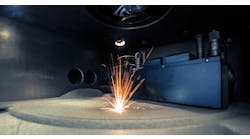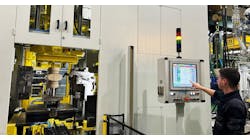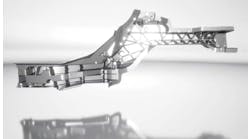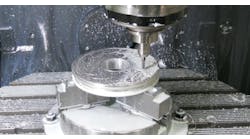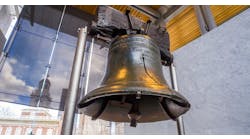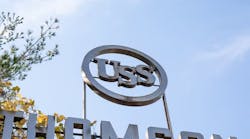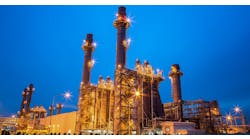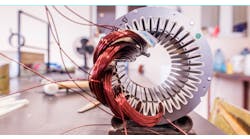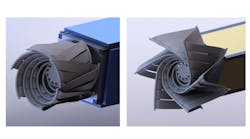O.K., technically it wasn’t just like “Field of Dreams,” the mythological baseball movie that likens Iowa to heaven, but leaders at Progress Casting Group Inc. (PCG) think they are batting 1.000 with their new home in New Hampton, IA. It already operates two foundries in Albert Lea and Plymouth, MN — where it keeps its headquarters.
Part of PCG’s enthusiasm is found in its own history. For more than 60 years, it has provided “total aluminum casting solutions” to domestic and international customers, with results that it credits both to design and process control. The company makes sure its casting experts get involved early with new customer programs, and incorporates “concurrent engineering.”
PCG engineers use state-of-the-art tools, like Pro/E™ CAD stations and Simtec™ solidification modeling, to ensure that final part designs match a customer's performance standards, and can be manufactured efficiently.
PCG’s commitment to quality assurance that includes real-time and film radiography, CMMs using 3-D solid models, certified quality labs, and extensive application of stastical process control. And, its quality systems and equipment meet international standards including ISO 9000-2000, Boeing D1-9000, and NADCAP certification, according to the company.
A fresh start
Midway through 2004, PCG began to consider building a third plant as part of a broader domestic expansion. The first question, of course, was where to build? PCG considered Albert Lea, where its ongoing operation employs 100, but it also looked at sites in South Dakota and Iowa.
“It was a tough choice,” explains PCG president Robert Silhacek. “South Dakota does very aggressive marketing for its state. But, I actually grew up in Iowa and still have friends there who suggested I look at Northeast Iowa. We looked at a lot of different issues, such as the available labor force, supply chain geography, customer accessibility, etc.
“Both South Dakota and Iowa offered very attractive tax incentives that were similar in nature, although structured differently,” the president recalls. “Finally, it came down to Vermillion, SD, Decorah, IA, and New Hampton, IA. But, when we considered all the factors, New Hampton fit the bill.”
The new plant sits on a 15-acre site and has approximately 180,000 ft2 of manufacturing space, plus 5,000 ft2 of office space. “We planned to leave room for expansion,” states Silhacek.
The plant is set up for a lean product flow throughout the facility, to help with product quality, and it is equipped
with new low-pressure molding technology supplied by CPC Inc. that offers state-of-the-art process-control capability, with modular furnaces that are expected to minimize production downtime for recharging.
PCG produces aluminum castings for a number of customers in the motorcycle, recreational, vehicle, transportation, food service, marine, and aerospace markets.
Customers include Polaris, Honda, BRP, Boeing, Rolls-Royce, Lockheed, Raytheon, and Hobart. The New Hampton plant, however, was built specifically to produce aluminum cylinders for Harley-Davidson.
Currently, the Iowa plant employs 70 people, with plans to increase to150 in the next few years. “We had 700-800 applicants for 70 jobs,” enthuses Silhacek. After four to six weeks of intensive training, those 70 individuals got to work in April, and shipped their first production casting to Harley-Davidson.
“Things have been going wonderfully,” says Silhacek. “We’ve been on time and on budget with this expansion.”
Maybe it is heaven.
Advantages of counter-pressure casting
After spending a reasonable amount of time studying the technological options available for low-pressure permanent mold casting at its new foundry, PCG settled on counter-pressure casting, a comparatively new commercial process recommended for casting safety-critical components.
Counter-pressure casting is similar to low-pressure casting, except that the permanent mold area operates under pressure, as does the furnace. Proponents — like CPC Inc., Lake Forest, CA — say the technology’s main advantages are that filling molds from below creates controlled, low-turbulence conditions that avoid inclusions, cold shuts, and other defects; and that solidification under increased gas pressure reduces structural defects. They say the process achieves better cast structures and is thus well suited for high-stress applications, such as vehicle safety components.
While the mold is being filled, the molten metal is exposed to increased pressure continuously, which suppresses hydrogen precipitation. During solidification, when the metal contracts, the pressure is maintained to prevent formation of solidification porosity and cavities. In combination with flexible mold cooling for controlled solidification of the casting, this results in high material yields.
Counter-pressure casting is highly automated, too, and it offers short cycle times so material yields are said to be higher than with permanent mold casting.
According to CPC Inc., counter-pressure casting can achieve an integral structure even in thick sections in the upper part of cast components without the use of risers. Still, if small risers are used they work under the same gas pressure, and their efficiency is increased, leading to a high yield of usable castings from the metal poured.
Since the whole casting process takes place in closed vessels, counter-pressure casting creates favorable working conditions with minimized air pollution.
In 1995, CPC Inc. joined with, Ilinden Ltd., a company headquartered in Pleven, Bulgaria, to develop and manufacture specialized foundry machines. The U.S.-based CPC modernizes the Ilinden-built counter-pressure, low-pressure, and vacuum-casting machines with Allen-Bradley or Siemens industrial controls. Today, these new improved machines are sold worldwide, and CPC reports that 150 have been sold in the U.S. over the past five years.
CPC also is affiliated with Original Ltd., in Sevlievo, Bulgaria, which designs and manufactures molds and dies for aluminum castings.
